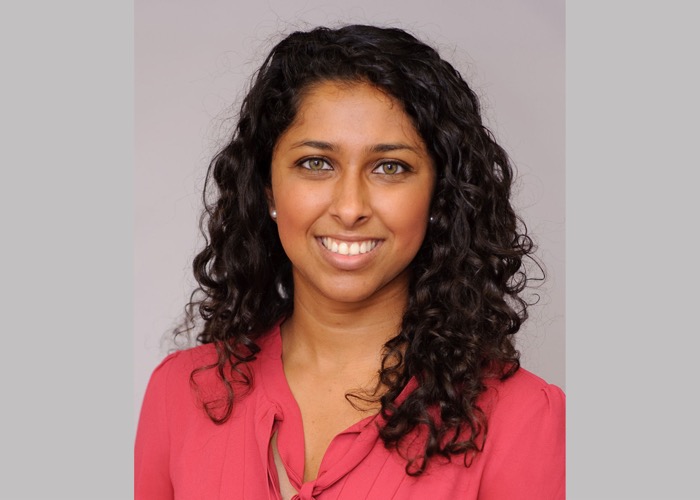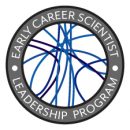
Kellyann Jones-Jamtgaard is a Biological Sciences Specialist at the USDA, where she supports education grant programs. Here, she talks about her passion for communicating the value of science to society and how that led her to pursue a career in science education and policy.
In the Decoding Life series, we talk to geneticists with diverse career paths, tracing the many directions possible after research training. This series is brought to you by the GSA Early Career Scientist Career Development Subcommittee.
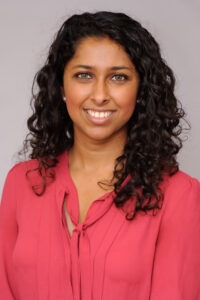
Kellyann Jones-Jamtgaard is a paragon of a successful science career shaped through volunteering opportunities and network building. She earned a PhD in Microbiology from the University of Kansas Medical Center. During graduate school, she engaged with students in local K-12 schools at outreach events and encouraged them to explore STEM careers. She aspires to be a role model for the next generation of STEM professionals by breaking down barriers and making science more inclusive.
After completing her PhD, she joined the education non-profit Partnership for Regional Educational Preparation – Kansas City (PREP-KC) as the Career Academies Liaison. At the same time, her interests in science policy enticed her to apply to the Christine Mirzayan Science and Technology Policy Graduate Fellowship Program, where she was a part of the 2017 fellows cohort. She was also appointed to the Kansas City Health Commission through her leadership in public service and healthcare advocacy.
Currently, Kellyann continues to broaden her knowledge and skills in science policy through her position at the National Institute of Food and Agriculture (NIFA), where she supports the education grant programs for institutions committed to improving the representation of minority groups in food and agricultural sciences. She manages the peer review process of grant applications and helps grantees manage funds and achieve their project goals.
What motivated you to choose a career in science education and policy?
When I started grad school, I was focused on finishing my PhD, doing a postdoc, and then becoming a faculty member somewhere. Halfway through, I asked myself, “Is that really what I want to do when I graduate?”
I did an individual development plan to assess my strengths, weaknesses, and career interests, which prompted me to explore careers in science education and policy. At the same time, I was involved with several student groups and organizations in my university and volunteering at local schools. I really enjoyed the interactions and challenges outside of the lab. Those were my passions that fuelled me and gave me the greatest joy!
While I still loved my research and being in the lab, it became difficult to keep going from experiment to experiment and dealing with failures, especially when I had interests outside of the lab. I still wanted to utilize the skills I gained as a scientist to encourage and help students learn about different STEM careers because being in the lab isn’t the only way to be a scientist. I wanted to communicate the value of science to students, the public, and policy makers.
How did your interactions with students at local schools inspire you?
I was primarily engaging with low-income students of color, specifically girls. When I was working with students, I would see myself reflected back at me. I grew up in the Bronx, New York. I’m a first generation American and my parents are immigrants from Guyana. I was the first one in my family to go to college and earn a PhD. A lot of the life experiences I had were very similar to the students I was serving. I wanted to find ways to motivate them, and to let them know that if they wanted a career in health or science, they could achieve it regardless of the barriers they may have faced. I benefited a lot in my career from mentorship opportunities for underrepresented students and I wanted to bring those same opportunities to the students I served, because I see myself as a success story of those types of opportunities.
Which experiences in graduate school helped you prepare for your career in science education and policy?
I volunteered with PREP-KC, a non-profit organization that provides educational opportunities to students from underrepresented and low-income backgrounds. I also participated in community health fairs and reading programs through local organizations. I worked with the Student Government and the Graduate Student Council as vice president and president, respectively. I was also very involved with the Student Diversity Council, which championed diversity amongst students on campus and created events for students to engage in efforts to increase diversity and inclusion. Those experiences taught me how to run a meeting, interact with students outside of my program, interact with faculty, become comfortable with public speaking, and be the face of an organization. These experiences also led to mentorship opportunities with staff and students. Every opportunity that I took advantage of as a graduate student, led to other opportunities and advanced my career.
How did networking help in your job search, and can you share some tips on building connections?
Throughout graduate school, I was constantly networking and was able to gain some inside information about different opportunities that helped me tailor my applications and my interviews to be successful. For example, I was mainly able to get my first job at PREP-KC, because they already knew me and my passion for science through my volunteering work there. My application to the Christine Mirzayan Science Policy Fellowship was strengthened through the interactions I had with the alumni of that program at scientific society meetings and science policy panels.
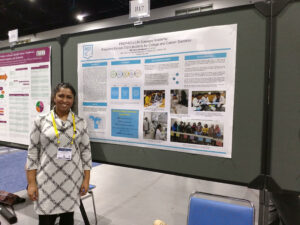
As a graduate student, it was intimidating to email someone without knowing them. I started by attending a lot of networking events and reaching out to people by saying that I heard them speak at an event and their words really resonated with me. This made it much easier to then convey my interest in learning more about their career path and if they would have some time for a phone call or to grab coffee. Everyone I spoke with was able to introduce me to other people in interesting career fields which helped me build my network. I maintain those networks now just by updating people on where I am or congratulate them if I see they’ve had a career accomplishment.
Why did you choose a position at the National Institute of Food and Agriculture (NIFA), and what are your key responsibilities there?
I was always interested in working for the federal government but I thought I needed to be in Washington, D.C. to be able to do so. My family and I are settled in Kansas City, and we’ll be here for the foreseeable future. When I heard about USDA moving some of its agencies to Kansas City, I considered it an opportunity to develop my career goals in science policy while working for the federal government. So, I followed updates about the vacancies at USDA through USAJobs.com and applied to the position of a Biological Sciences Specialist.
At the USDA – NIFA, I mainly support the peer review process. NIFA is the arm of the USDA that provides extramural funding primarily to land-grant universities, but also to non land-grant universities, small businesses, and nonprofits. When universities submit grants to NIFA, I help organize panels that review the grants and manage the process of getting the money out to the universities. I work with the grantees through the lifetime of their grants to make sure they meet their objectives and disseminate their great work to the public. In this way, the public is aware about the projects in food and agricultural sciences through NIFA. In addition to these responsibilities, I provide data to congressional staff and the federal government when they require information about the programs that we’re funding.
How have your various positions helped make science more inclusive?
At PREP-KC, it was easy to achieve a more inclusive scientific environment because one of our missions was to work with students from underrepresented backgrounds and provide educational opportunities for them to succeed. I led most of our STEM programming and got to bring students on field trips related to health and science, and run internship programs for students interested in research or general science careers.
At NIFA, I’m still pursuing diversity in science as the grant programs I’m involved with support Hispanic-Serving institutions, as well as Alaska Native-Serving and Native Hawaiian-Serving institutions. NIFA funds institutions that are providing opportunities to underrepresented students in food and agricultural sciences. Even though I’m not directly, one-on-one working with students anymore, I’m making science inclusive at a macro level by funding universities that are improving diversity and inclusion.
What aspects of your career do you enjoy and did you face any challenges?
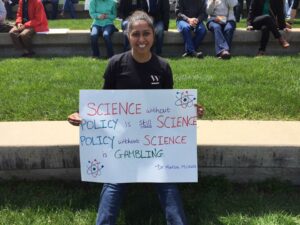
The most rewarding experience for me is impacting society with the science achievements through public service, which has tied my two careers together. With PREP-KC, I enjoyed working one-on-one with the students. Now with the federal government, it is really about being a good steward of the taxpayer money we give out to universities and making sure that the discoveries and programs being implemented can benefit the people.
Some of the difficulties I faced were in leaving academia. A more prescribed career path for graduate students is to do a postdoc and apply for faculty positions. It is a lot harder to navigate your career path outside of academia. For me, it was hard to figure out what value I could provide to an organization and convince them of that value, especially when a PhD isn’t necessarily needed for the position. The unknowns of navigating a non-academic career path may be a little unusual or outside the norm.
Do you have any advice for early career scientists interested in your career path?
Leaning into the uncertainty can be scary, but it can also be exciting! It is important to be OK with that discomfort and know it is a part of the process. Talk to as many people as you can, and learn about the variety of career paths people took to get to different places because no story is exactly the same. There is no recipe to get to a specific career. Be open to opportunities and go into things with an open mind, because you never know where the next opportunity for something may come from.
About the author:
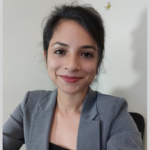
Oindrila De is a member of the Early Career Scientist Career Development Subcommittee and a PhD Candidate in the Department of Biology at Case Western Reserve University. She is passionate about making science inclusive and accessible to early career scientists with disabilities and leads the Accessibility and Disability Advocacy Group in the Early Career Leadership Program.
Learn more about the GSA’s Early Career Scientist Leadership Program.

